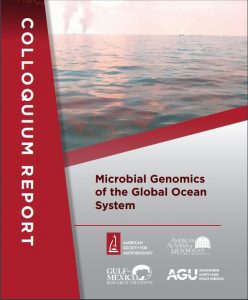New Report! Deepwater Horizon Discoveries of How Microbes Mitigate Oil Spills
– MAY 6, 2020
Technical advances in genomics since Deepwater Horizon have revealed the natural capacity of microbes to catalyze bioremediation of petroleum hydrocarbons. A just-released report, Microbial Genomics of the Global Ocean System, covers advancements in marine microbiology and metagenomics and explains how microbial communities in the Gulf of Mexico played a critical role in the oil spill cleanup by contributing core hydrocarbon bioremediation services.
The report is a joint effort of the American Academy of Microbiology (ASM’s honorific leadership group), the American Geophysical Union (AGU), and the Gulf of Mexico Research Initiative (GoMRI) who convened at an April 2019 colloquium. The group of experts, who represent several scientific disciplines, assessed the state of the field regarding new research tools, methodologies, data resources, collaborations, and models that will advance basic and applied research for microbial bioremediation.
“We are truly in an era of holistic science and synergistic collaboration of microbiologists, geologists, oceanographers, computational scientists, social scientists, and health professionals, all working together to address a societal crisis, the Deepwater Horizon Oil Spill, and to make new, fundamental discoveries in the process, the applications of which will improve response to oil spills…an excellent example of science during crisis,” said Rita Colwell, Distinguished Professor at the University of Maryland’s Institute of Advanced Computer Studies, Chair of the GoMRI Research Board, and former ASM President.
The report, authored by Dr. Samantha Joye (University of Georgia) and Dr. Joel Kostka (Georgia Institute of Technology), highlights new knowledge and approaches from recent discoveries in genomics and bioinformatics, which will be critical to guiding mitigation and future restoration strategies. These new strategies will build on natural microbial bioremediation capabilities without further disturbing sensitive ecosystems.
“This report highlights the importance of multidisciplinary scientific partnerships and how researchers working across different areas of science can enable transformative discoveries,” said Brooks Hanson, AGU’s Executive Vice President of Science. “The scientific knowledge gained by this collaboration has far-reaching impacts that will help us study and respond to future environmental challenges, including extreme weather events and climate change.”
For a more detailed summary of the report, read the ASM announcement here: https://asm.org/Articles/2020/April/How-Microbes-Clean-up-Oil-Lessons-From-the-Deepwat
The April 2019 colloquium and its resulting report are part of a larger GoMRI effort that is synthesizing findings from the best available oil spill research that contributes to new understanding and improved practices that are also applicable to other geographic locations and scenarios. The colloquium concluded with a public lecture by David M. Karl titled “A Proving Ground for Microbial Oceanography” available on AGU’s Facebook page: https://www.facebook.com/AmericanGeophysicalUnion/videos/281036182829275/.
By Nilde Maggie Dannreuther. Contact maggied@ngi.msstate.edu with questions or comments.
************
The Gulf of Mexico Research Initiative (GoMRI) is a 10-year independent research program established to study the effect, and the potential associated impact, of hydrocarbon releases on the environment and public health, as well as to develop improved spill mitigation, oil detection, characterization and remediation technologies. An independent and academic 20-member Research Board makes the funding and research direction decisions to ensure the intellectual quality, effectiveness and academic independence of the GoMRI research. All research data, findings and publications will be made publicly available. The program was established through a $500 million financial commitment from BP. For more information, visit https://gulfresearchinitiative.org/.
© Copyright 2010-2020 Gulf of Mexico Research Initiative (GoMRI) – All Rights Reserved. Redistribution is encouraged with acknowledgement to the Gulf of Mexico Research Initiative (GoMRI). Please credit images and/or videos as done in each article. Questions? Contact web-content editor Nilde “Maggie” Dannreuther, Northern Gulf Institute, Mississippi State University (maggied@ngi.msstate.edu).






